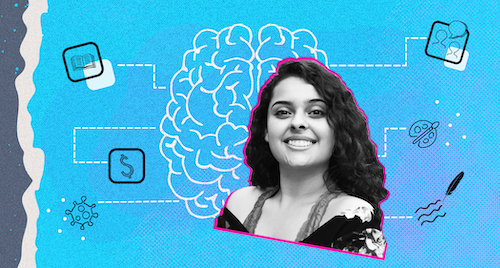
Social media posts show friends interacting while you sit alone. Streamed series like 13 Reasons Why — which is targeted at teens — promote suicide as a solution in challenging circumstances. And, with COVID isolation and public safety concerns, young people are experiencing high rates of anxiety, depression and self harm.
First-year student Naomi Alvarado, UM-Dearborn psychology major, says she sees the need for more mental health support through her internship at Michigan Medicine’s Depression Center. “There has always been a need, but COVID isolation has elevated the problem.” From experience, she knows the difficulty mental illness adds in all areas of life. But, also through experience, she’s learned that connecting with others lifts the burden.
Wanting to help build a space where people can find belonging, Alvarado — who would like to work in family therapy — developed a remote COVID-safe way for people to share and connect through creative expression. Her project “Unseen United” recently received a Naveed Arif Iqball Award for Mental Health Advocacy and Stigma Reduction grant through the Depression Center.
“My idea is to bring people who have underrepresented experiences together so we don’t feel alone and isolated,” says Alvarado, who’s improved her mental health through therapy and peer-based support programs. “I’m half Mexican and half white. In middle school, I remember feeling that no one was like me — that alone feeling brought on anxiety and depression. But, through peer mentoring and therapy, I learned that others out there don’t have your exact experience, but can relate. That helped me find a sense of belonging.” Alvarado says an underrepresented experience is one that’s not typically shared or seen.
The project encourages young people to create art through a variety of mediums — like short stories, poetry, painting — as a form of expression. The participants remotely meet via Zoom to discuss their mental health and creative process. Alvarado is currently seeking Washtenaw County residents who are in college and high school (ages 13-22) to take part. A video compilation of the art works will be posted online at a later date.
She says the focus is on adolescence because it’s an important developmental phase of life, teens early 20-somethings often do not have resources to secure mental health care on their own, and healthy coping skills are more likely to become habits if practiced from an early age.
“Even with different struggles, we can still learn from each other. Someone who is experiencing depression can relate to someone with OCD (obsessive compulsive disorder) and may learn a healthy coping mechanism that works for them,” Alvarado says. “That’s what this project is about. Uniting people as a way to share information and improve mental health.”
The project isn’t for any specific mental health condition. She’s noticed that the mental health community is often categorized in groups when it comes to support. But Alvarado has a more holistic approach.
“Mental illness does not define you as a person and the diagnosis shouldn’t define where you can go for support,” she says. “If you are struggling, you belong in this group. If you feel underrepresented, you belong in this group. If you want to share your story, you belong in this group. United Unseen is about belonging — and through that belonging, knowing there is a community of support to help you work through the problems you are facing.”
Mental health resources are available to UM-Dearborn students through the Counseling and Psychological Services (CAPS) office. If there is an immediate need, please call the CAPS crisis line at 1-855-275-1715.



